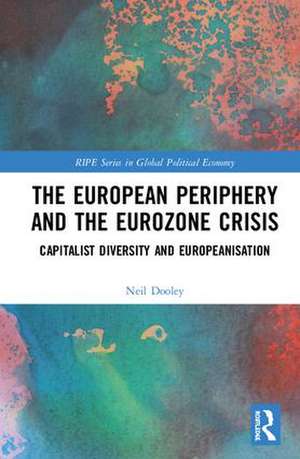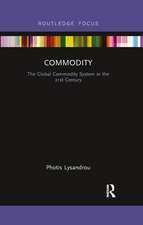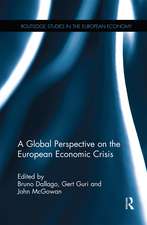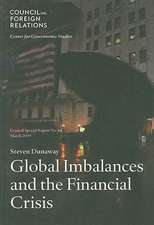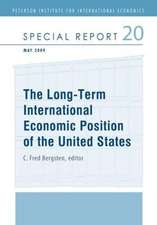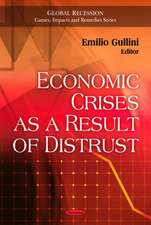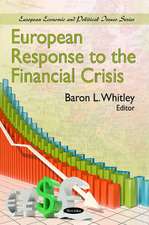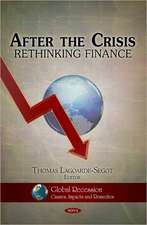The European Periphery and the Eurozone Crisis: Capitalist Diversity and Europeanisation: RIPE Series in Global Political Economy
Autor Neil Dooleyen Limba Engleză Hardback – 14 noi 2018
In contrast to accounts which stress the ‘immaturity’ of the European ‘periphery’, as well as more critical narratives that understand these countries as victims of German and core ‘economic domination’, this book recognises that individual peripheral countries have followed dramatically different paths to crisis, making it difficult to speak of the eurozone crisis as a single phenomenon. Bringing literature from Comparative Political Economy into dialogue with scholarship on Europeanisation, this book contributes the concept of ‘divergence via Europeanisation’. It explores the much-overlooked ways in which the negotiation of a ‘one size fits all’ project of European financial integration has been generative of precarious patterns of economic growth across Greece, Portugal, and Ireland. The book shows that far from their failure or inability to do so, it has been the European periphery’s attempt to ‘follow the rules’ of European integration that explains their current difficulties.
This novel understanding of the eurozone crisis should appeal to students and scholars in International Political Economy, European and European Union Studies, Comparative Political Economy, Irish Politics, Greek Politics, and Portuguese Politics.
| Toate formatele și edițiile | Preț | Express |
|---|---|---|
| Paperback (1) | 382.95 lei 6-8 săpt. | |
| Taylor & Francis – 30 iun 2020 | 382.95 lei 6-8 săpt. | |
| Hardback (1) | 762.97 lei 6-8 săpt. | |
| Taylor & Francis – 14 noi 2018 | 762.97 lei 6-8 săpt. |
Din seria RIPE Series in Global Political Economy
-
 Preț: 310.75 lei
Preț: 310.75 lei -
 Preț: 280.02 lei
Preț: 280.02 lei -
 Preț: 281.27 lei
Preț: 281.27 lei -
 Preț: 310.01 lei
Preț: 310.01 lei -
 Preț: 390.12 lei
Preț: 390.12 lei -
 Preț: 288.80 lei
Preț: 288.80 lei - 26%
 Preț: 820.21 lei
Preț: 820.21 lei - 18%
 Preț: 700.75 lei
Preț: 700.75 lei -
 Preț: 386.55 lei
Preț: 386.55 lei -
 Preț: 470.90 lei
Preț: 470.90 lei - 18%
 Preț: 999.46 lei
Preț: 999.46 lei - 18%
 Preț: 1054.97 lei
Preț: 1054.97 lei - 18%
 Preț: 1057.40 lei
Preț: 1057.40 lei - 18%
 Preț: 1055.60 lei
Preț: 1055.60 lei - 18%
 Preț: 1053.16 lei
Preț: 1053.16 lei -
 Preț: 362.26 lei
Preț: 362.26 lei -
 Preț: 456.16 lei
Preț: 456.16 lei - 18%
 Preț: 1058.79 lei
Preț: 1058.79 lei - 18%
 Preț: 1057.89 lei
Preț: 1057.89 lei - 26%
 Preț: 822.54 lei
Preț: 822.54 lei -
 Preț: 278.75 lei
Preț: 278.75 lei - 18%
 Preț: 1056.47 lei
Preț: 1056.47 lei - 18%
 Preț: 1057.89 lei
Preț: 1057.89 lei - 18%
 Preț: 1054.89 lei
Preț: 1054.89 lei -
 Preț: 453.96 lei
Preț: 453.96 lei -
 Preț: 411.42 lei
Preț: 411.42 lei -
 Preț: 428.67 lei
Preț: 428.67 lei - 26%
 Preț: 821.53 lei
Preț: 821.53 lei -
 Preț: 487.86 lei
Preț: 487.86 lei -
 Preț: 353.94 lei
Preț: 353.94 lei - 26%
 Preț: 846.78 lei
Preț: 846.78 lei - 31%
 Preț: 766.24 lei
Preț: 766.24 lei - 18%
 Preț: 1058.43 lei
Preț: 1058.43 lei - 15%
 Preț: 427.78 lei
Preț: 427.78 lei - 18%
 Preț: 696.82 lei
Preț: 696.82 lei -
 Preț: 395.16 lei
Preț: 395.16 lei - 18%
 Preț: 700.31 lei
Preț: 700.31 lei - 18%
 Preț: 1004.20 lei
Preț: 1004.20 lei -
 Preț: 465.69 lei
Preț: 465.69 lei - 15%
 Preț: 672.40 lei
Preț: 672.40 lei - 18%
 Preț: 1016.52 lei
Preț: 1016.52 lei - 18%
 Preț: 1115.21 lei
Preț: 1115.21 lei -
 Preț: 485.07 lei
Preț: 485.07 lei
Preț: 762.97 lei
Preț vechi: 1102.05 lei
-31% Nou
Puncte Express: 1144
Preț estimativ în valută:
145.99€ • 153.24$ • 121.18£
145.99€ • 153.24$ • 121.18£
Carte tipărită la comandă
Livrare economică 10-24 aprilie
Preluare comenzi: 021 569.72.76
Specificații
ISBN-13: 9781138048010
ISBN-10: 1138048011
Pagini: 172
Ilustrații: 23 Line drawings, black and white; 3 Tables, black and white; 23 Illustrations, black and white
Dimensiuni: 156 x 234 x 16 mm
Greutate: 0.39 kg
Ediția:1
Editura: Taylor & Francis
Colecția Routledge
Seria RIPE Series in Global Political Economy
Locul publicării:Oxford, United Kingdom
ISBN-10: 1138048011
Pagini: 172
Ilustrații: 23 Line drawings, black and white; 3 Tables, black and white; 23 Illustrations, black and white
Dimensiuni: 156 x 234 x 16 mm
Greutate: 0.39 kg
Ediția:1
Editura: Taylor & Francis
Colecția Routledge
Seria RIPE Series in Global Political Economy
Locul publicării:Oxford, United Kingdom
Public țintă
PostgraduateCuprins
1 Introduction: the asymmetry of the eurozone crisis 2 Beyond the ‘Lazy PIIGS’ and the German ‘Big Bad Wolf’ 3 Comparative Political Economy and Europeanisation 4 Greece 5 Portugal 6 Ireland 7 Conclusion: divergence via Europeanisation
Notă biografică
Neil Dooley is a Lecturer in Politics at the University of Sussex. His articles appear in New Political Economy, Millennium: Journal of International Studies and Third World Thematics: A TWQ Journal. Neil has written for The Washington Post, The Conversation, and Le Monde Diplomatique.
Recenzii
"This is an important book not just because it provides an original and convincing account for the way the Eurozone crisis played out across three different countries, but also because it combines insights from across comparative political economy and EU studies to produce a sophisticated conceptualization of how states and societies are shaped by European integration." - Rebecca Adler-Nissen, University of Copenhagen, Denmark
"Dooley’s book brilliantly addresses flaws in major arguments on the origins of the Euro-crisis. Rather than sorting countries into groups, Dooley recognizes the unique features of countries within the Euro-zone periphery that made them susceptible to the crisis in different ways; this susceptibility was driven, ironically, by their success in adopting EU banking reforms before and after the launch of the Euro. While the European project has promoted convergence, Dooley aptly identifies that Europeanization has led to a divergence in stable and sustainable financial development between the E(M)U’s member-states, an outcome that has yielded dangerous consequences." - Alison Johnston, Associate Professor, Oregon State University, USA.
"Neil Dooley's book demonstrates impressively the strengths of a nuanced approach to the study of the European political economy, interweaving themes of diversity and commonality via a discussion of the asymmetric impact of the Eurozone crisis. This is of particular importance for current debates about 'core' and 'periphery' but also European capitalism more generally. Therefore, the book is of strong relevance for literatures on 'peripheral' Europe, the multiple developmental trajectories that constitute European capitalism, and EU crisis management failures." - Dr. Ian Bruff, Lecturer in European Politics, University of Manchester.
"This is an excellent book, which adds much needed nuance to the intricacies of what became known as the European "sovereign debt crisis." Dooley persuasively argues that Europe’s periphery suffered disproportionately from the crisis, not due to their own immaturity or German economic domination, but because their political economies were ill adapted to follow the EU rules in the first place. Anyone wanting a deeper understanding of the Eurozone’s predicament will greatly benefit from reading this book." - Matthias Matthijs, Johns Hopkins University
"Dooley’s book brilliantly addresses flaws in major arguments on the origins of the Euro-crisis. Rather than sorting countries into groups, Dooley recognizes the unique features of countries within the Euro-zone periphery that made them susceptible to the crisis in different ways; this susceptibility was driven, ironically, by their success in adopting EU banking reforms before and after the launch of the Euro. While the European project has promoted convergence, Dooley aptly identifies that Europeanization has led to a divergence in stable and sustainable financial development between the E(M)U’s member-states, an outcome that has yielded dangerous consequences." - Alison Johnston, Associate Professor, Oregon State University, USA.
"Neil Dooley's book demonstrates impressively the strengths of a nuanced approach to the study of the European political economy, interweaving themes of diversity and commonality via a discussion of the asymmetric impact of the Eurozone crisis. This is of particular importance for current debates about 'core' and 'periphery' but also European capitalism more generally. Therefore, the book is of strong relevance for literatures on 'peripheral' Europe, the multiple developmental trajectories that constitute European capitalism, and EU crisis management failures." - Dr. Ian Bruff, Lecturer in European Politics, University of Manchester.
"This is an excellent book, which adds much needed nuance to the intricacies of what became known as the European "sovereign debt crisis." Dooley persuasively argues that Europe’s periphery suffered disproportionately from the crisis, not due to their own immaturity or German economic domination, but because their political economies were ill adapted to follow the EU rules in the first place. Anyone wanting a deeper understanding of the Eurozone’s predicament will greatly benefit from reading this book." - Matthias Matthijs, Johns Hopkins University
Descriere
This book investigates the origins of the eurozone crisis across three of the most severe cases – Greece, Portugal and Ireland.
